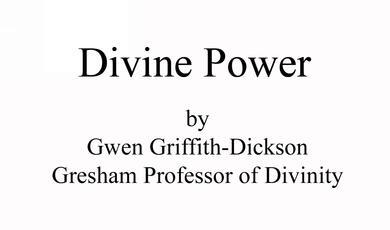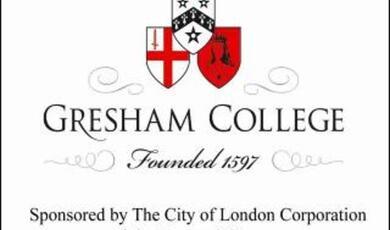Diversity and Danger - 'Diversity Rules: Competition, Liquidity and Equitable Markets'
Share
- Details
- Text
- Audio
- Downloads
- Extra Reading
This symposium hosted in association with the Lokahi Foundation will examine these paradoxes as they apply to religion, ethnicity, political views and economic systems. The final talk of the Symposium is as follows:
Diversity Rules: Competition, Liquidity and Equitable Markets by Professor Michael Mainelli (Gresham College, Z/Yen and London School of Economics and Political Science)
- Does diversity improve economic decisions? - Without diversity can we have equity? - How might global trends affect economic diversity?
Download Text
22 April 2009
Diversity Rules:
Competition, Liquidity & Equitable Markets
Professor Michael Mainelli
Does diversity improve economic decisions?
Without diversity can we have equity?
How might global trends affect economic diversity?
[SLIDE: OUTLINE]
[Good afternoon Ladies and Gentlemen. As Professor of Commerce, trust me, we need a commercial. First, my valedictory lecture of a four year series of 27 lectures is next month – “Commercial Philosophy: Science Or Religion?” – here at Barnards Inn Hall at 18:00 on Thursday, 21 May. Second, I’m pleased to announce a fascinating event in June as part of the City of London Festival. It’s a performance by John Harle, the brilliant saxophonist, and me, consisting of Benjamin Britten’s “Metamorphoses” combined with highlights of my Commerce lectures and graphics by Bill Joseph, “Metamorphoses: The Terrible Beauty Of Change”, here at Barnard’s Inn Hall at 13:00 on Monday, 22 June 2009.]
When Gwen asked me to speak today she mentioned that we should address fundamentalism and I was intrigued at the idea of applying thinking about fundamentalism to economics and finance. What I hope to outline in my half hour this afternoon is fairly straightforward. First, I hope to point out that diversity benefits us economically and financially. Second, I want to point out that, sadly, economics and finance are subject to fundamentalism. Third, I’d like to explore how current affairs such as the credit crunch, globalisation and technology may affect our view of diversity and fundamentalism. For those of you who have attended some of my Gresham lectures you may hear echoes of my previous lectures, self-plagiarism if you will, while for the rest of you novelty rules.
Well, as we say in Commerce – “To Business”.
Diversity Matters
[SLIDE: CREDIT SCRUNCH]
Does diversity matter in economics and finance? The answer is an unequivocal “yes”, but why? The credit crunch and the liquidity crisis lead to an obvious diagnosis – the financial system is defective. The credit crunch is a systemic failure with multiple causes and multiple effects. With limited time I need to focus in on one key failure point, lack of competition.
Market failure comes in three broad categories: lack of competition, information asymmetry/agency problems, and externalities. Wholesale finance certainly exhibits classic signs of lack of competition: self-evidently excessive salaries, a banking industry with 2006 profits per employee a magical 26 times higher than the average of all other industries worldwide (according to McKinsey), an industry that went from 5% of USA market capitalisation in 1990 to 23.5% in 2007, and a cast list of the top 10 that would be largely recognisable back in 1929, Goldman Sachs, Merrill Lynch, Lehman Brothers, Bear Stearns, Morgan Stanley, JP Morgan Chase, Citi … In summary, by 2007 there were less than 20 global investment banks, 4 auditing firms, 3 credit rating agencies. Perverse incentives of bonuses and regulatory exculpation expose the information asymmetry/agency problems. And, whether it is third world debt, savings & loan defaults, dot.com bubbles, or credit crunch problems, the burden borne by taxpayers around the world shows too clearly the externalities.
But lack of competition is key. When we see market failure we should first try and fix it through trust-busting or anti-monopoly laws – the 1890s in Britain, the 1900s in the USA. Only Private Eye [2 Octboer 2008, page 3] had the guts to call a spade a spade – “Gordon Brown promised to increase regulation to deal with collapsing financial institutions, but his biggest move so far is a massive decrease in regulation” suspending normal competition and takeover rules for Lloyds and Santander. Later we should add “supervision”, i.e. knowing what’s going on. Later still we should add regulation, i.e. saying what should go on.
People discuss the recent failure of free markets. Actually, the problem is that the financial markets that failed were hardly free, they were heavily regulated. Regulation failed to stop concentration in overly-large, dangerous banks. Perversely regulation creates barriers to entry, thus promoting large banks over the small. Financial services regulation is a religion - “regulation failed because you really really didn’t believe in regulation. So pray harder.” The religious faithful of regulation want to go much further the other way and now seek powers to follow mega-banks, rather than question whether size itself might be a sign of regulatory failure. But monopolies are ways to excess riches, and one way to achieve a monopoly is to throttle diversity.
Evolutionary Diversity
[SLIDE: EVOLUTIONARY DIVERSITY]
The evolutionary biologist, Jared Diamond [Diamond, 1999], explained how to get rich in 1999: “… we can extract from human history a couple of principles. First, the principle that really isolated groups are at a disadvantage, because most groups get most of their ideas and innovations from the outside”. Second, he derives the principle of intermediate fragmentation, “you don’t want excessive unity and you don’t want excessive fragmentation; instead, you want your human society or business to be broken up into a number of groups which compete with each other but which also maintain relatively free communication with each other.” For Diamond those are “the overall principles of how to organize a business and get rich.”
So, in theory and practice, why does diversity matter economically? First, isolated communities lose diversity and virility. Visting a small village or an island community is one thing, but different, non-urban behaviours must be observed to live there. Isolation is never good over the long-term, though in the short-term it may convey certain monopolistic benefits.
Second, applyingevolution to markets, society should pursue policies that encourage biodiversity. Adam Smith’s key insight was that markets’ harnessing of human desires, not all beneficial or benign, could achieve beneficial goals. Diversity among businesses is a result of competition and innovation. Research by Hofstede and Trompenaars on diversity within business shows clear benefits. Diversity means encouraging competition, so that one type of firm does not unnaturally predominate. Diversity requires aggressive anti-monopolies enforcement. Diversity means not leaping in too early with standards and regulations. Diversity means lowering risk and increasing reward for businesspeople, such as lowering the stigma and effects of bankruptcy or allowing them to reinvest more into innovation.
Third, diversity makes bubbles less likely. James Surowiecki, in The Wisdom of Crowds [2004], shows that large numbers of people can arrive at good answers to complex problems if four conditions apply:
¨ diversity of opinion – private, even eccentric views;
¨ independence – opinions uninfluenced by other opinions;
¨ decentralisation – local knowledge;
¨ aggregation – a mechanism for collective decision, e.g. a price.
The greater the independent diversity of opinion, the more likely the herd will reach the right answer. Markets clearly meet three conditions – diversity of opinion, decentralization and aggregation, but not Surowiecki’s second condition, independence. When you give a bad weather forecast predicting rain tomorrow, it does not make rain tomorrow more likely. But when you give a bad forecast predicting a share will fall tomorrow, you do make it more likely. “Talking a market” up or down frequently moves a market up or down. Feed-through information and regulation homogenise investors and investments – that thundering herd mentality we lament. We are social animals. Group sentiment drives economic behaviour. “The trend is your friend – the trend is your enemy.” But group sentiment crowds out diversity exacerbating the black holes of liquidity crises, as well as boom and bust. [Persaud 2002]
Fourth, decentralisation and competition seem to benefit all systems. The idea of decentralised, competitive system superiority exists both among organisations and within organisations. Brafman and Beckstrom’s book, The Starfish and the Spider: The Unstoppable Power of Leaderless Organizations, puts forward a metaphor. If you cut bits off a starfish they may regenerate or even replicate, but cutting off its head will kill the spider. The spider is centralised. The starfish decentralised. Today’s decentralised examples include Alcoholics Anonymous, Apache, Craigslist, Gnutella, Linux, Skype, and Wikipedia. Brafman and Beckstrom ponder, “what happens when there’s no one in charge … when there’s no hierarchy”. Sounds like an open market.
One discussion question concerns equity. There are echoes of the classic Rawls versus Nozick debate about a distributive society versus a libertarian society. Yet, both sides realise the importance of competition and variety. Without a functioning economy Rawlsians have nothing to distribute. Positive equity comes from diversity. However, competition unchecked can lead to concentration of power. Social libertarians realise the need to control power at some level but wish to avoid unnecessary appropriation for distribution. In fact, Nozick’s arguments flow from problems with a monopoly on force. While some direct mechanisms can be applied to break things up, e.g. estate taxes on death, far more important is breaking up power structures via competition, followed by ensuring competition exists through the application of anti-trust or anti-monopoly laws.
Fifth, I would add Ashby’s Law of Requisite Variety to the analysis. Ashby’s Law, originally from cybernetics, states that the amount of appropriate selection that can be performed is limited by the amount of information available; and that for appropriate regulation the variety in the regulator must be equal to or greater than the variety in the system being regulated. Or, the greater the variety within a system, the more regulation will reduce its variety. For example, significant government direction of R&D inevitably reduces the essential variety behind true innovation thus, as innovation is about variety, government direction of R&D is necessarily inferior to no direction.
But more diversity clashes with society’s increasingly risk-averse behaviours. To quote Baroness O’Neill, “Our revolution in accountability has not reduced attitudes of mistrust, but rather reinforced a culture of suspicion. Instead of working towards intelligent accountability based on good governance, independent inspection and careful reporting, we are galloping towards central planning by performance indicators, reinforced by obsessions with blame and compensation.”
Baroness Onora O’Neill, “The Philosophy of Trust” (2002)
Fundamentalism In Economics And Finance
[SLIDE: CLOSED BELIEF SYSTEMS]
People wonder how there can be fundamentalism in quasi-science such as economics and finance. But let’s take the fun out of fundamentalism and focus on the mentalism. Richard Bronk rightly points out the need to put romanticism back into economics. He points out that “our pursuit of self-interest inevitably involves an imaginative and creative element”. [Bronk, 2009, page 103]. Bronk points to the need to eschew simplistic mechanical metaphors, to value pluralism, to recognise variety in human motivation and to appreciate the role of metaphor in interpreting what we see and how we react.
Fundamentalism refers to a belief in, and strict adherence to a set of basic principles. Sadly, it’s all too easy to fund-a-mentalism. Economic and financial debating lines are as hard-drawn and fierce as those of the Gaza Strip or Belfast’s Falls Road - long-term/short-term, fiscal/monetary, Keynesian/Friedmanite, free/regulated, selfish/selfless, mutual/owned, public-sector/private-sector, rational/human, equality-of-opportunity/equality-of-outcome. We have no shortage of fundamentalists, heretics or apostates. Let alone high-priests, shamans or gurus. As for charlatans, well… Rather ironically, while Keynesians seem fervent, John Maynard Keynes himself was agnostic: “When the facts change, I change my mind. What do you do, sir?”
Fundamentalist principles dictate crucial policies all around us, for example letting banks go bust or saving them, quantitative easing or fiscal prudence, deflation or inflation, and the distribution of income and wealth. In the current crisis, economic religions dictate the flows of global finance and the funds of government intervention. One big problem for the scientists among you is that these belief systems are not experimentally proven. This is not necessarily because practitioners have necessarily avoided experimental proof, to some degree experimentation in economics and finance is complicated. The adherents to particular beliefs have a limited degree of ability to test their beliefs and have to rely on faith for much of their conviction. At Gresham College, where Sir Thomas himself funded the idea of New Learning, i.e. experimental science, it is important to admit that the concept of scientific inquiry in Commerce is worshipped more in the abstract than used to test commercial faith.
I am reminded of Koestler’s closed belief systems. ‘Closed systems’ have three main peculiarities. First, they claim to represent a truth of universal validity which explains everything. Second, the system “cannot be refuted by the evidence, because all potentially damaging data are automatically processed and reinterpreted to make them fit the expected pattern”. Third, criticism is invalidated by shifting the argument to the motivation of the critic. Koestler provides an example of a closed system from the orthodox Freudian school of pyschoanalysis. “…if you argued that for such and such reasons you doubted the existence of the so-called castration complex, the Freudian’s prompt answer was that your argument betrayed an unconscious resistance indicating that you yourself have a castration complex; you were caught in a vicious circle” [Koestler, 1967, pages 263-264]
Much of economic and finance is about closed belief systems. You can’t get to the other side from here, thus the other side is wrong. For example, I chaired a lecture last year where one of the participants patiently explained why the oil markets, with all the national oil companies, weren’t true markets, and why banking, with all its vested interests, wasn’t a true market. While I can agree at many points, it is a bit frustrating to realise that the participant’s beliefs cannot be refuted by the evidence because none of the markets were true markets. In some ways that is the comfort of fundamentalism; we sell ourselves on our own viewpoints; our world view is a self-reinforcing security blanket. I contend that there may be five stages progressing from cocktail party belief flirtation to fundamentalism:
¨ Cocktail Party Atheism - one holds to the fundamental end belief of all social sciences, Contingency Theory, i.e. it all depends;
¨ Agnosticism - one has a set of beliefs, but not so fundamental that other belief systems are excluded;
¨ Faith - one has a set of beliefs, but respects the right, however feeble, for other belief systems to exist;
¨ Fundamentalism - one has a set of beliefs, they are right to the exclusion of other beliefs, no other set of beliefs need exist and I can impose my views over yours;
¨ Fanaticism - one has a set of beliefs, they are right, other beliefs must be exterminated for the benefit of others.
[SLIDE: ANARCHISTS OF THE WORLD, UNITE!]
Of course, if fundamentalism is a singular application of theory to the exclusion of others, then anarchism, i.e. nothing rules, is the fundamental application of the subversion that nothing will work. The only way to avoid fundamentalism is to have no beliefs at all, and not believe in having no beliefs. Rather perversely, assuming one wishes to do anything at all, anarchism nicely cycles round to the atheism of Contingency Theory. Yet, what do we do? Do we hold no beliefs, everything depends, Contingency Theory rules? Do we pick and choose as appropriate, some kind of pragmatism? But doesn’t pick and choose just weaken the edifice? What would we say about a mathematician who said 2+2? It all depends. Or 2+2? I’ll pick a system that fits. Finally, if we accept the idea of picking and choosing pragmatic economic and financial systems, then what heuristics do we use and aren’t those heuristics just as fundamentalist as the constituent systems among which we select?
At the moment, tolerance is a weak position for pragmatic atheistic or agnostic economists and financiers. Numerous politicians without convictions justify all sorts of means through wishful ends. Being charmed or beguiled by Contingency Theory means that they have little invested that no particular position is worth a vigorous defence, whether the positions be the free market, government intervention, open borders to trade, or whatever, nothing is worth the candle. As flexibility grows, conviction diminishes, meanwhile somewhere between Fundamentalism and Fanaticism strengthening convictions converge on one belief, that “the end justifies the means”. During a crisis, with the concomitant social imperative to “do something”, fanatics can overrun non-ideological positions with ease. In the perverse way of feed-through (or positive feedback), the fanatics become emboldened by their ideological successes and reinforced in their beliefs. Fanaticism has its self-gratification while tolerance simply has another cheek.
For an interesting example of these feedback mechanisms, consider some proponents of Sharia or Far Eastern finance. They point out that western finance has had a great failure. True. They then claim that their systems would not have failed. Possibly. But even the possibility is positive feedback and emboldens ideological attacks. We are in the realms of belief rather than hard science or social science. I hasten to add that these adherents may well be correct in their beliefs, but their systems require much more research, analysis and validation before they can claim that they would be a better substitute.
A good indicator of the fragility of belief systems is their dependence on history. History is important to fundamentalism. Systems coalesce around the stories surrounding beliefs. History can sometimes provide justification – decades or centuries of adherents can’t be wrong. History can also provide a trajectory – something rooted in a more distant past must have a purpose, implying some teleology. So it’s not surprising to find economic fundamentalists tracing their way back to Keynes or Ricardo or Smith. The more the story matters, the more we need to question the story if what matters is what works.
Other good indicators of Fundamentalism and Fanaticism are splinter groups. Sayre’s law is named after Wallace Stanley Sayre (1905-1972), a political scientist and professor at Columbia University. Sayre supposedly said, “In any dispute the intensity of feeling is inversely proportional to the value of the stakes at issue.” By way of corollary: “That is why academic politics are so bitter” or “Academic disputes are so bitter because there is so little at stake.” I don’t have time, given that the stakes are so low, to explore the many and multifarious splinter groups in economics and finance, but trust me that they exist.
Current Affairs
[SLIDE: CURRENT AFFAIRS: WHAT IS THE SOUND OF AN ARMY’S FOOTSTEP?]
After every financial crisis we seem to come back to the same three policy recommendations: more transparency and disclosure, more risk management and regulation, and yet more ‘accountability’, which usually implies a new bureaucracy, new simplified models and a set of targets. Reformers ignore how regulation reduces diversity. Dwight D Eisenhower said that “the uninspected deteriorates”, but I might say that “the overinspected becomes embalmed”.
Yet, regulators have traditionally claimed to place great store in the importance of diversity, for example promoting the benefits of OTC derivatives or structured debt prior to 2007. In 2006, Timothy Geithner said, “In terms of enhancing overall market efficiency, the growth of these private leveraged institutions (hedge funds, private equity funds, etc.) can be expected to provide benefits in terms of improved liquidity, price discovery via arbitrage, diversity of opinion and diversification opportunities for investors.”
Still, for example, by obliging all firms to account using mark-to-market and allocate capital based on Basel II, regulators homogenized diversity unnecessarily. John Eatwell points out:
“… the emphasis on disclosure reduces the diversity of information that has in the past created diversity of action. Today, information is ever more readily available, and disclosure of price sensitive information is legally required. … But the attainment of equal information is bought at a cost - increased likelihood of herd behaviour as all react in the same way to the same news.” [John Eatwell, “Basel II: The Regulators Strike Back”, The Guardian, 9 June 2002 - http://www.guardian.co.uk/business/2002/jun/09/theobserver.observerbusiness9]
Professor Michael E McIntyre advances an interesting argument. He points out that society seems to promote unthinkingly the principles of fairness, objectivity, and prudence. Fairness – treat everyone equally. Objectivity – measure things to a standard. Prudence – err on the side of caution, and don’t trust people who say that they audit themselves. McIntyre states, “It’s a brave soul who dares to question any of these principles in public today, at least as ideals to be aspired to.” He points to two implications. First, “infinite regression, and infinite cost. The auditors of the auditors of the auditors … must be audited.” Over-auditing leads to loss of competition and lack of diversity.
Resilient Versus Robust
[SLIDE: DIVERSITY & COMPETITION]
The problem is that all this connectivity and centralisation leads not just to economies of scale, but also single points of failure. A resilient system returns to the state it was in. A robust system can handle major changes of state. I talk of ‘resilience’ as the ability to handle extremes within the same systems, or ‘robustness’ as the ability to use the same system in different environments. Resilience is getting by through a shock - resilient systems perform within the range of historic volatility. Robustness is getting over an enduring change in the environment - robust systems handle step changes in volatility. As a sailor, I think of a Bristol pilot cutter as a robust boat – able to handle a lot of conditions – while an America’s Cup boat is resilient – great unless it really blows.
I’d like to marshall our thoughts so far against this slide that contrasts competition and diversity. On the vertical axis we have competition, from low to high, protected to open. On the horizontal axis we have diversity, from left to right, low to high. The four resulting intersections are worth a mention:
¨ low competition and low diversity can be efficient in terms of economies of scale. This is fine so long as situations are known and stable – known knowns you might say. For me, one of the most interesting economic problems in this space is posed by Airbus. As it looked as if Boeing would have a monopoly on large passenger aircraft, the European community, at great expense, created a competitive duopoly by launching the Airbus. Though Europe has probably come out even, the benefits from Airbus have spilled across the world through more diversity and lower prices;
¨ high competition and low diversity are found in a lot industries, for example less-regulated utilities (these days) such as phone companies or oil companies;
¨ high diversity and low competition is rarely found, and when found it is often due to peculiar regulation or high, but uncertain growth, for example travel agents or headhunters or estate agents;
¨ high diversity and high competition is characteristic of very robust systems, very often accompanied by decentralisation. However, this is not an unalloyed good. Analysis frequently shows easy ways to increase efficiency, but analysis tends to ignore social forces and power structures. If these robust systems become powerful, people tend to get nervous, or acquisitive. The Internet has moved in 15 years from being a peculiar place for geeks to something that everyone has designs on regulating.
One final analytical problem is worth noting. Resilient systems are often measured on the “economies of scale” of how much cost per unit. Resilient systems are usually cheaper on this measure. Robust systems are better measured as options, they provide a richer range of responses. Though competition may appear to cost a bit more and be a bit wasteful, over time competitive options often produce reduced total system costs.
Long Finance
[SLIDE: LONG FINANCE]
To conclude: I sympathise with a class of anti-globalisation protestor who regrets economic homogenisation ab initio, but that probably doesn’t get us far. In a world of inter-connected media global information creates global perceptions that feed-through to global bubbles. The challenge for financial reformers is to slow feed-through’s many mechanisms, such as market prices, valuations or regulatory standards, yet satisfy the clamour for increased transparency. Markets will behave better when we can solve the paradox of providing global information without overwhelming diversity in local opinions. Other high-level conclusions include:
¨ too big to fail is too big to regulate – financial services is a bit special (so are pharmaceuticals, defence, electricity, air travel, shipping, water, …), but the fundamental regulatory tool in all markets is competition and we need to increase competition in financial services, not reduce it;
¨ increases in regulation reduce diversity – a healthy financial services ecosystem should exhibit diversity, yet society appears to over-value presumed economies of scale in financial services;
¨ heterogeneity – encouraging the broadest possible range of investors, from individuals, to corporates, mutuals, investment managers, insurers, share clubs, gamblers or hedge funds, into multiple markets;
¨ measurement – we need to distinguish a deep and diverse market from a homogenous one. The traditional anti-monopoly measure is market share or concentration. Perhaps before approving takeovers or mergers we should consider introducing into competition law some biodiversity measures (is this a rich eco-system?), or fractal measures of complexity, or simplistic caps on size, or set raw numbers of participants who must exist before takeovers will be approved.
Everyone has their favourite fixes (including me), but the question we should be asking far more stridently is “how would we know when the financial system is working?” More permanent solutions need permanent questions, such as “can a 20-year-old responsibly enter into a financial structure for his or her retirement?” Such a question raises a host of related issues. The question draws in actuaries, accountants, life insurance, savings, investments, security, fraud, risk, returns and firm defaults. An average 20-year-old today should, under reasonable actuarial expectations, live to 95. Most 20-year-olds with whom I talk assume they’ll live to 120. So the question implies a financial structure that should last 75 to 100 years. Yet The Economist [“Where Have All Your Savings Gone?”, 6 December 2008, page 11] observes: “Any American who has diligently put $100 a month into a domestic equity mutual fund for the past ten years will find his pot worth less than he put into it; a European who did the same has lost a quarter of his money”. So 20-year-olds, and others, vote with their savings.
I don’t know how 20-year-olds can responsibly enter into a financial structure for their retirement, but I do believe that the question matters. Another permanent question might be, “how do we fund a forest?” These questions remind me of a question posed by the computer scientist Danny Hillis in 1995, “how could one build a clock to last 10,000 years?” Dr Hillis’ question led to the 01996 (sic) Long Now Foundation, providing a counterpoint to today’s “faster/cheaper” mindset by promoting “slower/better” thinking. From the Long Now Foundation emerge projects such as a timeline tool (Long Viewer), a library for the deep future (Long Server), and tracking bets on long-term events (Long Bet). Another venture with long-term aims is Carlo Petrini’s Slow Food movement. Perhaps we need a Slow Finance movement or, my favourite, a Long Finance Foundation.
Once you look at the problems involved in Long Finance, you realise that many of today’s sustainable finance issues arise because society’s core, global risk/reward transfer system, finance, doesn’t have enough diversity to deal with the long-term. In conclusion, I have one fanatical belief then, “diversity rules!”.
Thank you.
[SLIDE: DISCUSSION]
Further Reading
1. ASHBY, W.R. “Self-regulation and Requisite Variety” in Emery, F.E. (ed) Systems Thinking, Penguin (1983).
2. BRONK, Richard, The Romantic Economist: Imagination In Economics, Cambrdige University Press (2009).
3. HOFSTEDE, G., “Motivation, Leadership and Organization: Do American Theories Apply Abroad?”, Organizational Dynamics(Summer 1980), 42-63.
4. HOFSTEDE, G., Culture’s Consequences, Sage Publications (1980).
5. HOFSTEDE, G., Cultures and Organisations: Software of the Mind, McGraw-Hill (1991).
6. KOESTLER, Arthur, The Ghost in the Machine, Penguin Books Ltd (1967).
7. PERSAUD, Avinash, “Liqudity Black Holes”, World Institute for Development Economics Research, Discussion Paper No. 2002/31 (March 2002) - http://www.wider.unu.edu/publications/dps/dps2002/dp2002-31.pdf
8. SUROWIECKI, James, The Wisdom of Crowds: Why the Many Are Smarter Than the Few, Little, Brown (2004).
9. TROMPENAARS, Fons and Hampden-Turner, Charles, Riding the Waves of Culture: Understanding Cultural Diversity in Business, Nicholas Brealey Publishing Ltd (1997).
Further Surfing
1. Jared Diamond, “How To Get Rich”, The Edge, (6 July 1999) - http://www.edge.org/3rd_culture/diamond_rich/rich_p1.html
2. Professor Michael E McIntyre’s thoughts on “Audit, Education And Goodhart’s Law, Or, Taking Rigidity Seriously” - http://www.atm.damtp.cam.ac.uk/people/mem/papers/LHCE/dilnot-analysis.html.
3. Baroness Onora O’Neill’s 2002 Reith Lectures - http://www.bbc.co.uk/radio4/reith2002/
Thanks
Many diverse people have contributed to my thinking, but I’d particularly like to thank Ed Brown, Bob Giffords, Ian Harris, Bill Joseph, Richard D North and Jan
© Professor Michael Mainelli, 2009
Part of:
This event was on Wed, 22 Apr 2009
Support Gresham
Gresham College has offered an outstanding education to the public free of charge for over 400 years. Today, Gresham College plays an important role in fostering a love of learning and a greater understanding of ourselves and the world around us. Your donation will help to widen our reach and to broaden our audience, allowing more people to benefit from a high-quality education from some of the brightest minds.


 Login
Login







